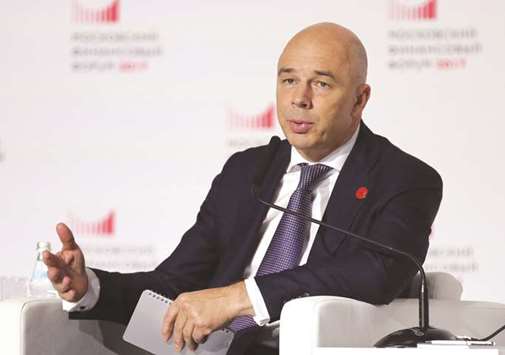Russia’s finance ministry will more than double its purchases of foreign currency next year under the new fiscal mechanism aimed at limiting the economy’s dependence on the oil price.
The buying will total about 2tn roubles ($34.6bn) if prices for Russian crude average $54-55 a barrel next year, rising to about 2.8tn roubles if the oil price is around $60, finance minister Anton Siluanov told reporters. Over the 11 months the ministry has conducted purchases this year, it bought a total of 829bn roubles.
“We will be taking up to 70% of the oil-and-gas revenues into reserves under the budget rule,” Siluanov told reporters, referring to those above the threshold in the budget. “Until now, that figure was lower, about 30-40%.”
The rule was introduced this year to help insulate the exchange rate and the economy from Russia’s heavy dependence on energy prices. When oil prices are above $40 a barrel, the excess income is diverted into purchasing reserves. Starting from 2018, the formula for calculating the amounts bought is changing, effectively removing the impact of the exchange rate and increasing the volume of foreign exchange to be acquired.
“Even if there is volatility on commodity or capital markets, then it will affect the rouble’s exchange rate less than under the previous calculation method,” Siluanov said. “The rouble rate depends less and less on the oil price because we’re more actively using the budget rule.”
If oil prices hold around $55 a barrel and no new Western sanctions are imposed on Russia next year, “the exchange rate will probably stay about where it is.” This year, the rouble has gained 6.1% against the dollar, while Brent is up 15%.
Yury Tulinov, an analyst at Rosbank in Moscow, said the new rule is likely to contribute slightly to rouble weakness. He sees the Russian currency at 63.2 against the dollar at the end of next year. The rouble was trading at 57.77 per dollar in Moscow yesterday.
“The macro effect from the new budget rule is positive because it stabilises the budget, reduces the ruble’s dependence on oil and curbs inflation,” he said.
According to VTB Capital analyst Alexander Isakov, for every dollar the oil price rises above the threshold in the budget, the ministry will increase purchases by $2-2.5bn a year.
Even as the ministry buys foreign currency to replenish reserves under the budget rule, it also sells from its holdings to help cover the budget gap.
Next year’s foreign-currency purchases will exceed the amount taken from the wealth fund, according to Siluanov. This year’s use of reserves was about twice the amount of purchases.

Siluanov: New rule is likely to contribute slightly to rouble weakness.
